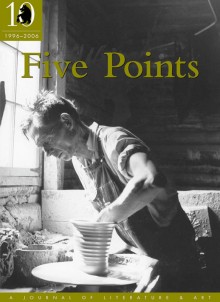Five Points, Vol. 10 No. 1&2
Fall - Spring 2006From Mary Lee Settle, “I demand irony from my reader. You know more than the people in the books know.”
Sample Content
Cary Holladay
Hollyhocks
Every one of Dudley Fenton’s six older brothers is married, and when Dudley is drunk, he can’t remember the names of their wives. On nights when Dudley is locked out of the house, his head buzzing, the harder he tries to remember, the more the names elude him. The only sure thing is that eventually he will remember them, and eventually, he’ll get back inside the house. As he circles from one door and window to the next, he knows he’s safe: Philip the cook will have left a pantry window cracked open for him. Yes, there is the window: he finds it in the moonlight. The window is high off the ground, off the brick patio at the back of the house, facing the Blue Ridge Mountains.
Dudley has to haul a stepladder from the tool shed, climb it, part the hollyhocks that grow so tall beneath that window, all stiff and dead with stalks so spiny they cut his hands, and jimmy the window up. The effort takes all his strength. While he pushes and pries, thoughts of his sisters-in-law run through his mind: the rich one, the shady one, the fussy one, the loud one, the prissy one, and the sweet one, who is his age and a new bride, and whom he loves.
Who locked him out? Why lock the doors of a house so far out in the country, you can’t even shout to your neighbors? His own mother did it. It’s her comment on his drinking. She waits until he goes outside to check on the dogs or to get a hidden bottle from his car or from the barn. Then she’ll lock the windows and the heavy doors, and he has tried them, every one. In the summertime or the fall, he’ll climb the ladder, or a tree limb, if necessary, to the second floor, to ease through a French door or an open window. In winter, if it weren’t for Philip and the pantry, he’d be out of luck.
The cold’s a bear on his back, hanging onto him, blasting its breath down his neck.
When at last the window is up, he launches himself inside, crashing across the cabinet beneath the sill, a space cluttered with glassware and crockery and cake pans, his body unwieldy, knocking all those clattery breakables to the floor. Always he plans to thank Philip for leaving the window unlocked, but they have never spoken of this. Philip understands about Dudley’s loneliness and the drinking and probably, Dudley figures, even knows how Dudley feels about Patsy—there, her name comes to him even as he untangles his legs, bumping an iron skillet to the floor—Patsy, the sweet one. The visits to her husband’s family, Dudley can tell, are a trial to her. Constantly she twirls strands of her hair or bites her lips. She doesn’t have the competitive spirit of the other wives. Her husband Barrett, Dudley’s next-oldest brother, blurts out truths that embarrass her, revealing how she worries about thank-you notes, wondering if hers are all right. Barrett announces these things at the table, and Patsy flushes red. The other wives pick on her or ignore her, except for the shady one, who is sometimes her friend.

